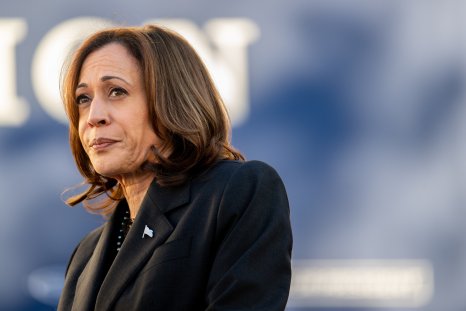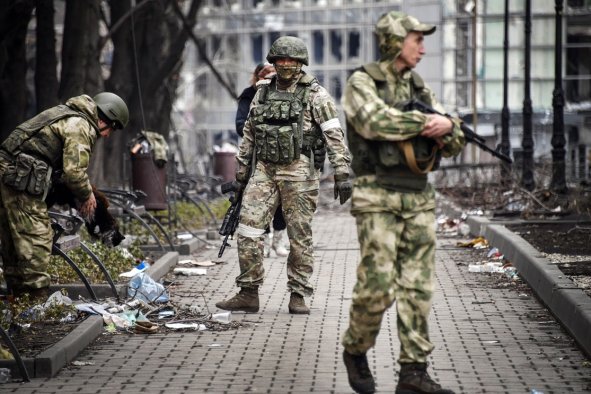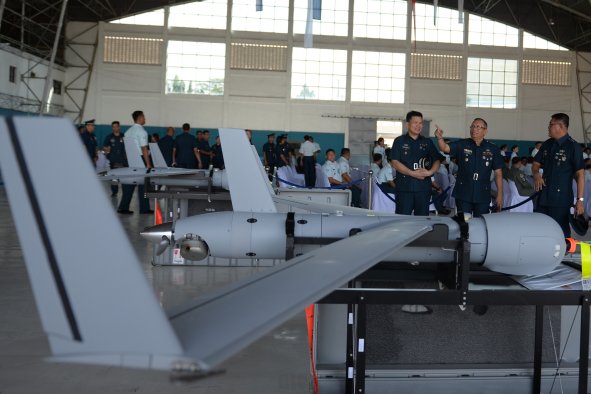China has demanded that the United States make commitments on nuclear weapons by adopting a no-first-use policy and giving up its "nuclear umbrella" to allies in Europe and Asia after Beijing suspended arms control talks with Washington over Taiwan last week.
The Chinese Foreign Ministry on Monday published two working papers in relation to the "no-first-use of nuclear weapons" policy and nuclear security assurances. They were first submitted on July 12 to the Preparatory Committee for the 2026 Review Conference of the Parties to the Treaty on the Non-Proliferation of Nuclear Weapons, or NPT.
The objectives of the international treaty NPT included preventing the spread of nuclear weapons and weapons technology and furthering the goal of achieving nuclear disarmament, the United Nations Office for Disarmament Affairs said.
The treaty was opened for signature in 1968 and entered into force two years later. The five nuclear-weapon states—China, France, Russia, the United Kingdom and the U.S.—are among the 191 states that have joined the treaty. The group is also known as the "P5," as the five states are permanent members of the U.N. Security Council.
China advocated a "no-first-use of nuclear weapons initiative" in the working paper and called on the rest of the P5 to follow its step to publicly promise not to be the first to use nuclear weapons "at any time and under any circumstances."
The working paper encouraged the P5 to negotiate and conclude a treaty with unlimited duration on "mutual no-first-use of nuclear weapons" or issue a political statement in this regard. It also presented four draft elements as a basis for deliberation.
China said in the paper that a nuclear war would only bring "huge disasters" to humanity; however, one of the draft elements specified that it is the right of a state party to withdraw from the proposed treaty if "extraordinary events" have jeopardized the supreme interests of its country.
China has never disclosed the size of its nuclear arsenal, which it said was for self-defense, not for threatening others. The Stockholm International Peace Research Institute estimated that the country possessed about 500 nuclear warheads as of January.
The U.S. Defense Department said in its report on China's military power last year that if a conventional military defeat in Taiwan gravely threatened the ruling Chinese Communist Party, Beijing would probably consider using nuclear weapons to restore deterrence.
China views the self-ruled Taiwan as a breakaway province, and it has never renounced the use of force to unify the island with the mainland. The U.S. has sold weapons to Taipei for decades, and Beijing has accused Washington of severely undermining its core interests.
On July 17, China's Foreign Ministry announced the decision to stop nuclear talks because of the U.S.'s arms sales to Taiwan. The U.S. State Department said it was an unfortunate decision made by the Chinese that had undermined U.S.-China strategic stability.
Adam Scheinman, the U.S. special representative of the president for nuclear nonproliferation, said to the NPT Preparatory Committee on Monday that China is expanding its nuclear stockpile while avoiding engagement in arms control. He questioned the country's commitment to nuclear restraint.
The U.S. released declassified nuclear arsenal information on Friday. "We believe that increasing the transparency of states' nuclear stockpiles is important to nonproliferation and disarmament efforts, including commitments under this treaty," Scheinman said.
In a separate working paper, China said nuclear sharing and extended deterrence have diminished the willingness of nonnuclear states participating in "arrangements to build nuclear-weapon-free zones or conclude an international legal instrument on security assurances."
It further urged the "relevant nuclear-weapon state" to abandon the arrangement of nuclear sharing and extended deterrence and withdraw all nuclear weapons deployed overseas.
The Chinese working paper did not name the above single nuclear-weapon state; however, the U.S. has such nuclear arrangements with Australia, Japan, NATO and South Korea.
Washington has committed to extending its nuclear capabilities to protect the three Indo-Pacific allies. For the transatlantic alliance, it is estimated that the U.S. has deployed about 100 tactical nuclear bombs for battlefield use across five European countries.
Europe-based American nukes would be armed on certified non-U.S. fighter jets for nuclear strikes in case of conflicts. Nuclear deterrence, including nuclear sharing, is the core of NATO's mutual security guarantee and collective defense, the alliance said.
Moscow and its closest ally in Minsk agreed to deploy Russia's tactical nukes in Belarus last year as a countermeasure to NATO's support of Ukraine. China stressed the importance of avoiding nuclear war at that time, but it refused to denounce the move.
Daryl Kimball, the executive director of the Arms Control Association, criticized the P5 for modernizing, upgrading and expanding "their deadly nuclear arsenals as if they intend to keep nuclear weapons indefinitely."
In a statement delivered on Tuesday to the NPT Review Conference, he urged the P5 to negotiate a joint commitment not to use or threaten the use of nuclear weapons and to agree that none will be the first to use them for any reason.
Disclaimer: The copyright of this article belongs to the original author. Reposting this article is solely for the purpose of information dissemination and does not constitute any investment advice. If there is any infringement, please contact us immediately. We will make corrections or deletions as necessary. Thank you.



